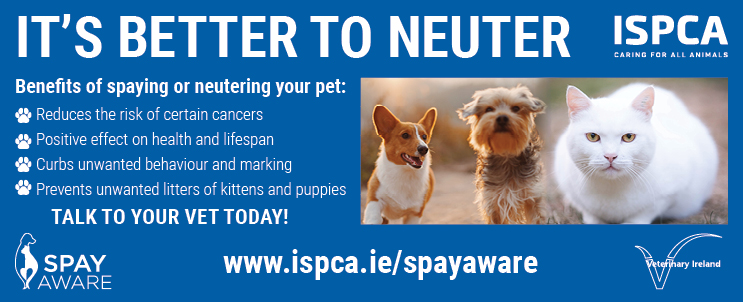CATS
View the benefits for: CATS / DOGS / FERAL CATS / Is spay or neuter good for ALL pets?
Is spay or neuter good for ALL pets?
Neutering is a general term which refers to castration of male animals and spaying of female animals. Neutering normally involves a quick, routine procedure to remove the ovaries or the ovaries and uterus in females (spay/spey) or the testicles in males (castration).
In the vast majority of cases, neutering is the best policy for most pets, strongly recommended, and considered as important as vaccinations, worming and flea treatment in order to maintain your petís health and well-being. However, unlike other routine preventative health care measures, neutering is usually a once off investment in your petís health care. Occasionally, however, there may be circumstances where your vet may not recommend neutering or may recommend delaying neutering. This is why it is highly recommended to book a consultation with your veterinary surgeon or veterinary nurse to discuss neutering.
A pre-neutering check-up usually includes a full health check-up as well as a full discussion of your petís individual needs. During this consultation, your vet or veterinary nurse will carry out a cost-benefit analysis for your pet, as it is important to consider the benefits of neutering for each animal on an individual basis.
Unfortunately, in an era of internet based information technology, there are many misconceptions about neutering. Pet owners need to be vigilant about advice given by dog/cat breeders or information found on certain web sites, as some of this information can be misleading or not based on significant scientific evidence. If in doubt, ask your local veterinary surgeon for advice. Your vet or veterinary nurse will be happy to help, will listen to your concerns and can review any information which has been given to you by breeders, other members of the public or web site information for you.
We at Spay Aware are also happy to answer any queries or concerns that you may have about neutering. If you require further information about neutering, the veterinary team at your local practice may be able to direct you to relevant web sites providing reliable information (e.g. www.lovemypet.ie or vethelpdirect.com); or provide you with printed information leaflets about neutering.
There is currently quite a lot of academic research being conducted in regard to the cost: benefit analysis of neutering. Spay Aware and Veterinary Ireland are keeping a close eye on this research in order to keep both the general public and the veterinary profession informed of the latest developments and to keep our recommendations up-to-date. It is hard to give general guidelines for all pets regarding neutering as it is always best to assess each pet on a case by case basis, however, situations where neutering may need to be delayed might include the following:-
Cases of congenital urinary incontinence since birth
it is recommended to delay neutering in female dogs with this condition until after the first season/heat.
A female dog in season/heat-
it is recommended that it is safer to wait until 2-3 months (10-12 weeks) post-season/heat before neutering.
A female dog with a phantom pregnancy
it is not recommended to neuter during a phantom pregnancy as you dog is lactating/producing milk- neutering at this time would leave your dog locked in a cycle where she continually produces milk even after neutering. Your vet can prescribe medication to Ďdry upí milk production, after which your dog can be neutered.
Large and Giant Breed Dogs
it is now recommended that neutering be delayed until after the first season to allow for skeletal maturation. While cats, ferrets, rabbits and smallmedium sized dogs may all be skeletally mature by 6 months of age, larger breed dogs may still be growing up to 9-12 months of age. It is therefore recommended that large breed dogs are neutered around 9 months of age, while giant breeds may benefit from delaying neutering until at least 1 year of age (this greatly reduces the likelihood of bone tumors in these giant breed dogs later in life).
Cases where another medical or surgical treatment is required more urgently.
Situations where your vet may recommend NOT neutering might include:-
-Cases when a pet has such a serious illness that undergoing an anaesthetic might be too risky for the individual to undergo neutering. N.B.: Neutering is normally performed in healthy animals to prevent certain health and behavioural problems, however, in certain cases, such as life-threatening womb infections, pregnancy complications, mammary or testicular cancer or prostate problems, the cost-benefit analysis performed by your veterinary team may indicate that emergency neutering is required.
Aggressive female dogs
While neutering may help to greatly reduce aggression in male dogs over time by removing testosterone (a male sex hormone which can contribute to aggression) from the body, the same cannot be said for female dogs. Female dogs do not usually produce large amounts of testosterone, so removing the ovaries and uterus may not be the best solution in this case.
If your female dog is aggressive, we would strongly recommend discussing the problem with your local veterinary practitioner who will discuss the various treatment options with you or refer you to a canine behaviour professional.
Finally, there have been a few studies recently which tentatively suggest that in certain dog breeds, a number of rare cancers might be slightly more common in animals which are neutered young. These studies however, had statistically very low numbers of participants in skewed environments, so more research is required to confirm if these findings are significant.
Nevertheless, these initial findings need to be viewed in conjunction with the fact that other more common cancers such as mammary tumors are far less common in female animals which are neutered young, while the risk of testicular cancer is completely removed by neutering of males. Benefits also include removing the risk of unwanted pregnancy and life-threatening womb infections in females, and minimising the risk of prostatic disease and aggression in males which may lead to cat bite abscesses or other wounds which require veterinary attention.
Neutering young also reduces the likelihood of your pet straying far from home while looking for a mate. A high proportion of injured animals involved in road traffic accidents are entire un-neutered pets such as female animals in heat/season or entire un-castrated males chasing other animals or searching for a mate. These examples demonstrate the reasons why it is imperative that each and every neutering decision is made on an individual basis after thorough discussion with your local veterinary team.
In most other cases, the benefits of neutering greatly outweigh any other concerns.
However, if in doubt, always consult your local veterinary practice team who will be more than happy to advise you on the best course of action for your own pet. The Spay Aware team are also happy to help by providing any information you require and responding to any queries.




Connect with us: